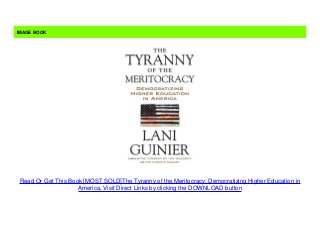
Meritocracy in its wider sense, may be any general act of judgment upon the basis of various demonstrated merits such acts frequently are described in sociology and psychology. This is in contrast to the original, condemnatory use of the term in 1958 by Michael Dunlop Young in his work " The Rise of the Meritocracy", who was satirizing the ostensibly merit-based Tripartite System of education practiced in the United Kingdom at the time he claimed that, in the Tripartite System, "merit is equated with intelligence-plus-effort, its possessors are identified at an early age and selected for appropriate intensive education, and there is an obsession with quantification, test-scoring, and qualifications". Like " utilitarian" and " pragmatic", the word "meritocratic" has also developed a broader connotation, and is sometimes used to refer to any government run by "a ruling or influential class of educated or able people". In a more general sense, meritocracy can refer to any form of evaluation based on achievement.

These are often determined through evaluations or examinations. In government and other administrative systems, "meritocracy" refers to a system under which advancement within the system turns on "merits", like performance, intelligence, credentials, and education. The "most common definition of meritocracy conceptualizes merit in terms of tested competency and ability, and most likely, as measured by IQ or standardized achievement tests".

Meritocracy was most famously argued by Plato, in his book The Republic and stood to become one of the foundations of politics in the Western world.


 0 kommentar(er)
0 kommentar(er)
